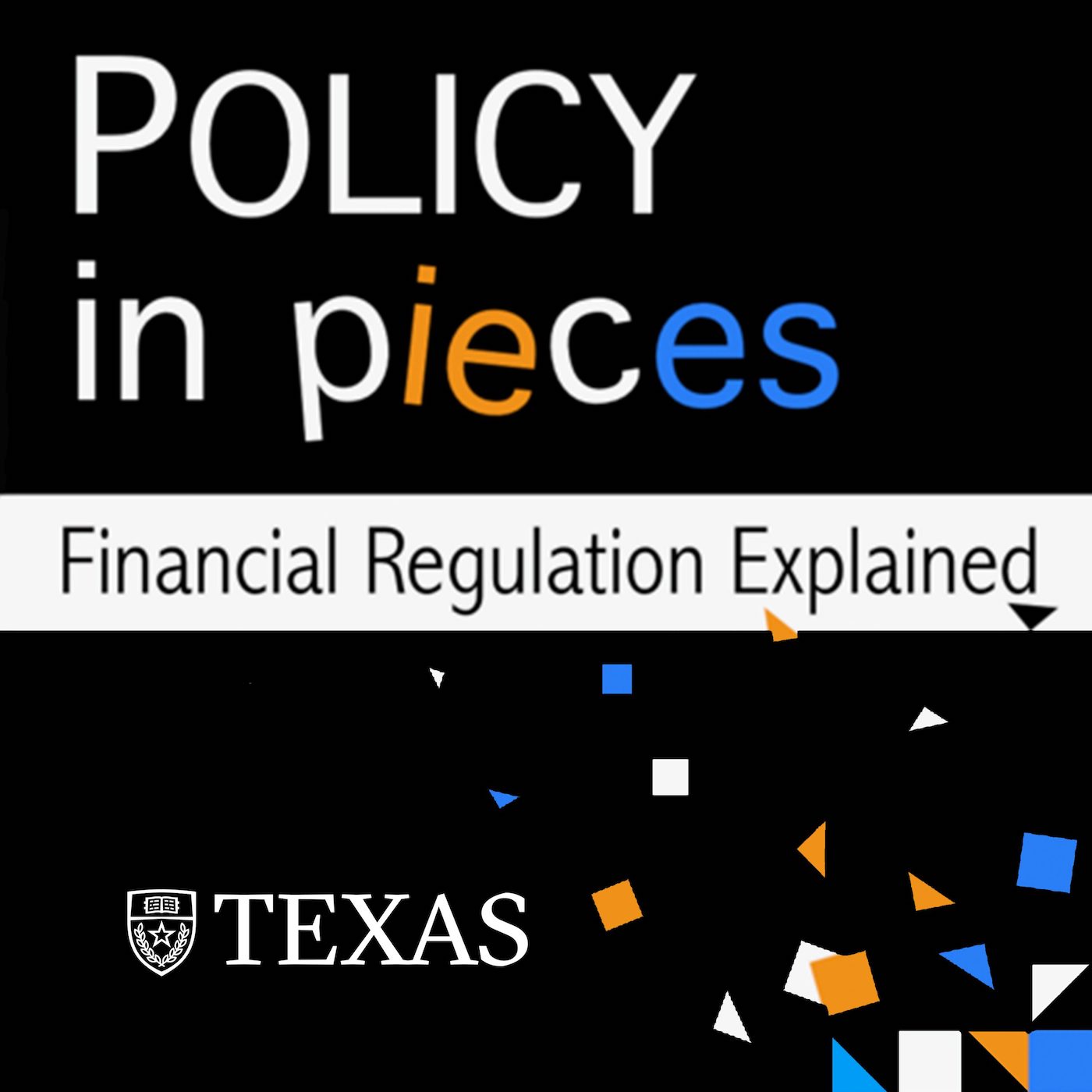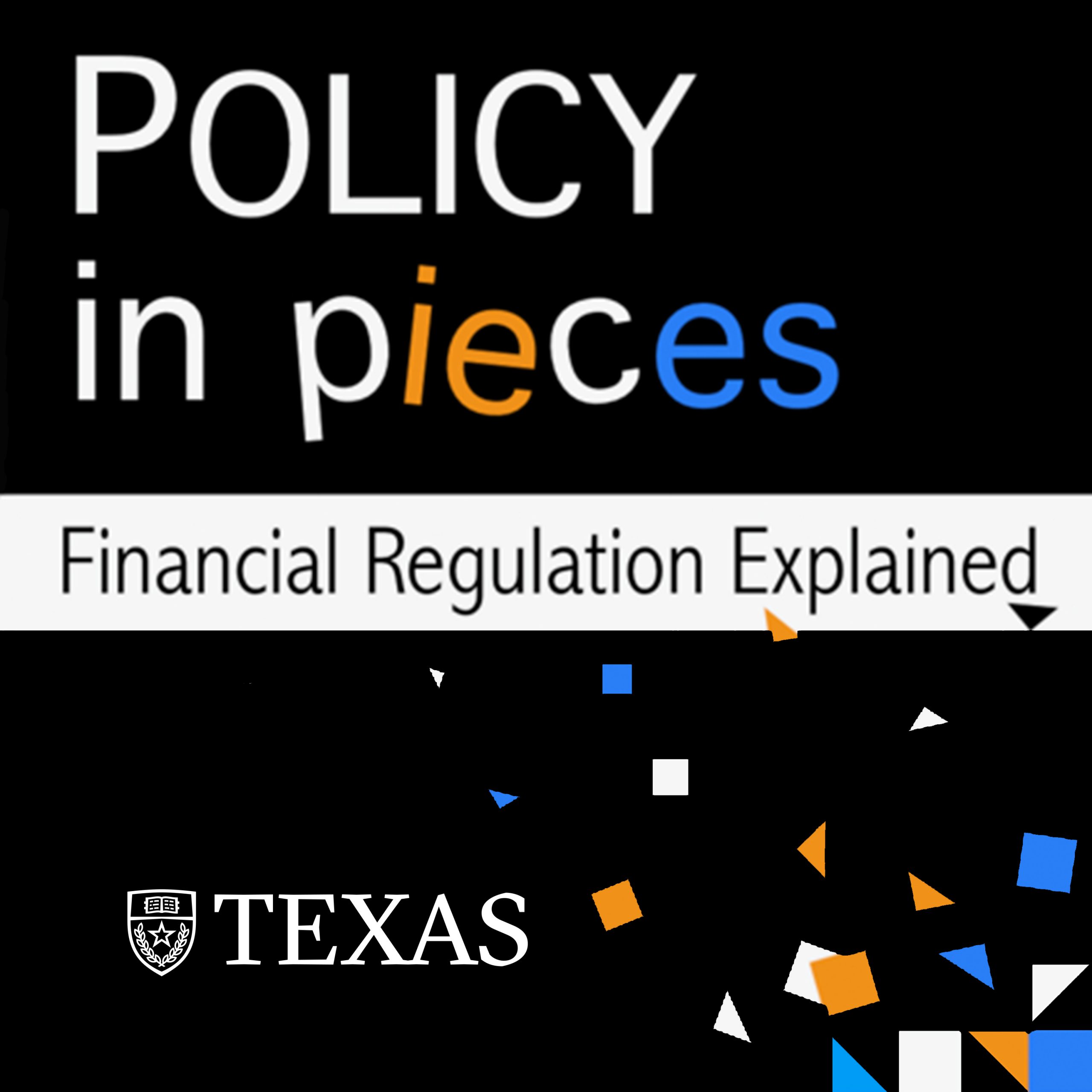Discover Policy in Pieces
Policy in Pieces

Policy in Pieces
Author: Salem Center for Policy
Subscribed: 1Played: 65Subscribe
Share
Description
Join UT-Austin professor and Salem Center director Scott Bauguess as he breaks down active and important regulatory issues in financial markets with student co-hosts and special guests from government, industry, and academia.
Texas Podcast Network is brought to you by The University of Texas at Austin. Podcasts are produced by faculty members and staffers at UT Austin who work with University Communications to craft content that adheres to journalistic best practices. The University of Texas at Austin offers these podcasts at no charge. Podcasts appearing on the network and this webpage represent the views of the hosts, not of The University of Texas at Austin.
Texas Podcast Network is brought to you by The University of Texas at Austin. Podcasts are produced by faculty members and staffers at UT Austin who work with University Communications to craft content that adheres to journalistic best practices. The University of Texas at Austin offers these podcasts at no charge. Podcasts appearing on the network and this webpage represent the views of the hosts, not of The University of Texas at Austin.
25 Episodes
Reverse
Recently departed CFTC Commissioner Brian Quintenz talks about his experience overseeing commodities markets, the political process governing regulation, and from his new role as an advisory partner at Andreesen Horowitz (A16Z), he discusses what he believes should be the future of crypto-asset regulation.
Harvard Law School professor John Coates talks about his recent roles at the SEC, first as the head of the Division of Corporation Finance, and then as the Agency’s general counsel. For years he has studied financial regulation through the lens of a scholar, and he shares with us what it was like to put […]
You may not realize, but the SEC is not the only securities market regulator in the US. Melanie Lubin, the Maryland Securities Commissioner and current President of NASAA (North American Securities Administrators Association), joins this episode to explain ‘cops on the beat’ securities regulation at the State level, and how States coordinate with each other […]
London Business School professor Alex Edmans, a leading scholar on ESG related issues, and author of the recent book “Grow the Pie,” joins this episode to explain a new way to think about evaluating company performance, dispelling the common belief that corporate purpose and profit can’t co-exist.
Wes Bricker, Vice Chair and co-leader of Trust Solutions at PwC and Chair of XBRL International, joins this episode to explain how technology is changing the corporate audit, the bumps in the road with the adoption of machine readable reporting, and what to expect with emerging ESG standards.
John Griffin, a distinguished professor of finance at the University of Texas, talks about forensic finance, and how for the past decade he has dedicated his research pursuits to finding fraud. His most recent paper alleges that 1.8 million loans issued as part of the government’s COVID-19 relief program for small businesses, totaling $76 billion, […]
J. Robert (“Jay”) Brown, legal scholar and recently departed member of the Public Company Accounting Oversight Board, explains how this young regulator, created following the Enron accounting scandal, oversees audit firms. It’s still a teenager, and as Jay describes, there remains some work to do, to fulfill its mission.
Ira Hammerman, general counsel of the trade association SIFMA, joins our episode to discuss how regulation is shaping massive changes in the brokerage industry. He addresses controversial topics like payment for order flow, gamification of trading, and the role of investor choice and advice giving under new Regulation Best Interest.
Crypto assets are becoming mainstream. Tens of millions of Americans own them. SEC Commissioner Hester Peirce, affectionately known as crypto mom for her pioneering thoughts on how digital assets should be treated by regulators, joins this episode to discuss their meteoric rise, potential future treatment by the SEC, and other views in this now $2 […]
Bernie Madoff perpetrated the largest investment fraud in U.S. history. The SEC never knew, and its revelation shook the agency to its core. Former Enforcement attorney Stephen L. Cohen was put in charge of building the system to keep it from happening again. He joins this episode to reflect on the events that led from […]
Former SEC Director of Enforcement, Stephanie Avakian, explains how legal actions are brought against those alleged to have engaged in market misconduct, the role of politically appointed Commissioners in deciding the actions, and how the process is changing with the new administration.
One of the most influential academic researchers on analyses that inform financial market policy is University of Chicago professor Christian Leuz. His peer-reviewed publications have informed 19 different policy actions spanning both democratic and republican administrations. In this episode, he explains what government regulators and academics need to do, to be even better, at implementing sound policy.
Listen to MIT Professor SP Kothari talk about leading the economic division at the SEC during the Trump administration. He shares views on regulating markets during a pandemic, criticism received, and a host of issues from taxes and inflation to share repurchases and accounting for social equity in cost benefit analyses.
BlockRock co-founder, Barbara Novick, talks about the firm's journey to a $9 trillion AUM, experiences from the global financial crisis, and how she started the global policy group and became a leading voice on financial market reform.
Eric Pan, CEO of the Investment Company Institute, discusses how the trade association develops views on behalf of its members and the 100 million investors that they serve, including on one of the most pressing issues of the new administration — Environmental, Social, and Governance disclosures by regulated entities. Also hear his views on proxy voting, money market funds, FSOC, LEI, and recent market volatility.
On January 20, the President directed federal agencies to promote "social welfare, racial justice, environmental stewardship, human dignity, equity, and the interests of future generations” in the regulatory review process. SEC Commissioner Caroline Crenshaw explains her support of the memo principles and discusses how they are related to a host of issues within the SEC’s regulatory purview.
Babson College professor Erik Sirri talks about money market fragility, his experience as a senior official at the SEC during the global financial crisis when they 'broke the buck', and how subsequent reform didn’t prevent them from being bailed out again, at the onset of the pandemic. He shares his thoughts about what to do now.
Legendary VC investor Bill Gurley, an outspoken critic of the traditional IPO process, explains how the rise in SPACs and the emergence of direct listings are addressing the long-standing and controversial practice of bank underpricing of initial public offerings.
Dan Taylor, an accounting professor of the Wharton School, and director of the Wharton Forensic Analytics Lab, describes his effort to define, identify, and address illegal insider trading through his academic research and policy advocacy.
Paul Andrews, outgoing Secretary General of the International Organization of Securities Commissions, joins us to discuss global coordination of financial market regulation, IOSCO's role in promoting financial stability, and views on regulatory developments related to GameStop, SPACs, Ant Financial, and ESG disclosure.






